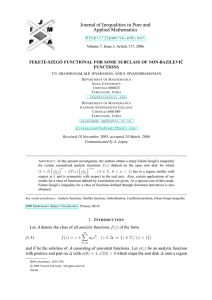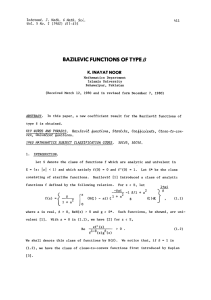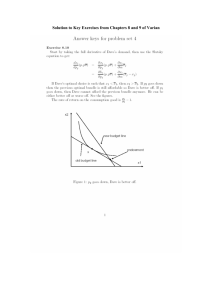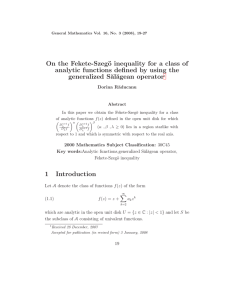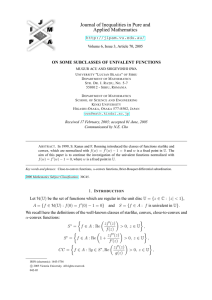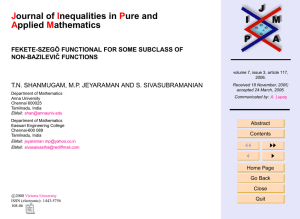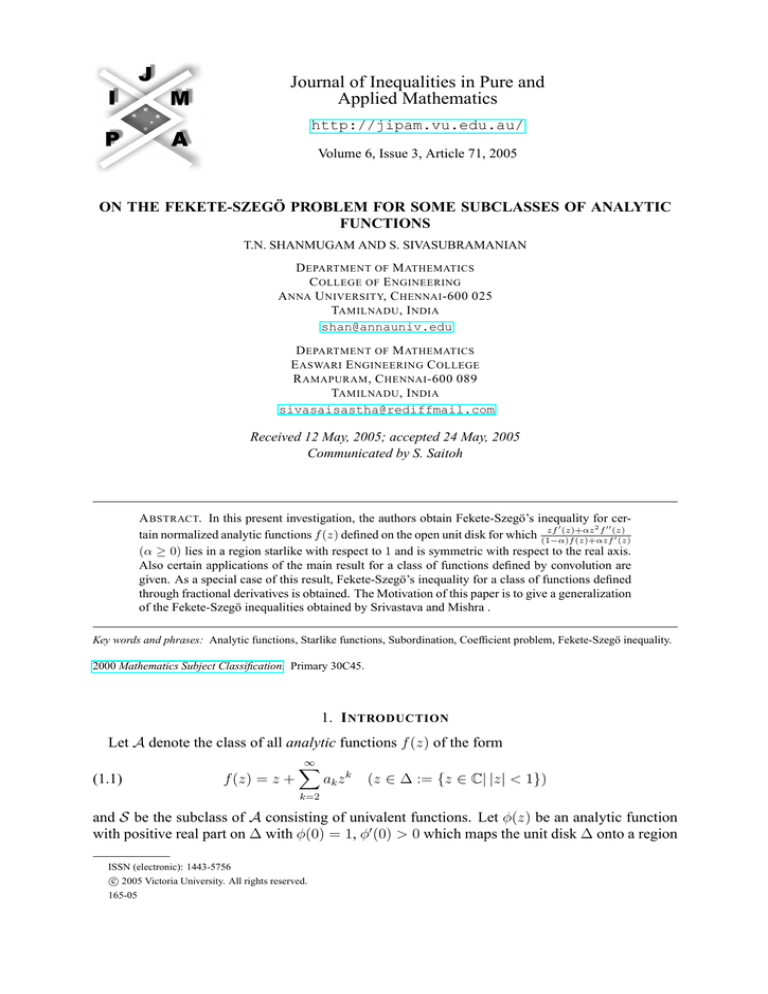
Journal of Inequalities in Pure and
Applied Mathematics
http://jipam.vu.edu.au/
Volume 6, Issue 3, Article 71, 2005
ON THE FEKETE-SZEGÖ PROBLEM FOR SOME SUBCLASSES OF ANALYTIC
FUNCTIONS
T.N. SHANMUGAM AND S. SIVASUBRAMANIAN
D EPARTMENT OF M ATHEMATICS
C OLLEGE OF E NGINEERING
A NNA U NIVERSITY, C HENNAI -600 025
TAMILNADU , I NDIA
shan@annauniv.edu
D EPARTMENT OF M ATHEMATICS
E ASWARI E NGINEERING C OLLEGE
R AMAPURAM , C HENNAI -600 089
TAMILNADU , I NDIA
sivasaisastha@rediffmail.com
Received 12 May, 2005; accepted 24 May, 2005
Communicated by S. Saitoh
A BSTRACT. In this present investigation, the authors obtain Fekete-Szegö’s inequality for cerzf 0 (z)+αz 2 f 00 (z)
tain normalized analytic functions f (z) defined on the open unit disk for which (1−α)f
(z)+αzf 0 (z)
(α ≥ 0) lies in a region starlike with respect to 1 and is symmetric with respect to the real axis.
Also certain applications of the main result for a class of functions defined by convolution are
given. As a special case of this result, Fekete-Szegö’s inequality for a class of functions defined
through fractional derivatives is obtained. The Motivation of this paper is to give a generalization
of the Fekete-Szegö inequalities obtained by Srivastava and Mishra .
Key words and phrases: Analytic functions, Starlike functions, Subordination, Coefficient problem, Fekete-Szegö inequality.
2000 Mathematics Subject Classification. Primary 30C45.
1. I NTRODUCTION
Let A denote the class of all analytic functions f (z) of the form
(1.1)
f (z) = z +
∞
X
ak z k
(z ∈ ∆ := {z ∈ C| |z| < 1})
k=2
and S be the subclass of A consisting of univalent functions. Let φ(z) be an analytic function
with positive real part on ∆ with φ(0) = 1, φ0 (0) > 0 which maps the unit disk ∆ onto a region
ISSN (electronic): 1443-5756
c 2005 Victoria University. All rights reserved.
165-05
2
T.N. S HANMUGAM AND S. S IVASUBRAMANIAN
starlike with respect to 1 which is symmetric with respect to the real axis. Let S ∗ (φ) be the class
of functions in f ∈ S for which
zf 0 (z)
≺ φ(z),
f (z)
(z ∈ ∆)
and C(φ) be the class of functions in f ∈ S for which
1+
zf 00 (z)
≺ φ(z),
f 0 (z)
(z ∈ ∆),
where ≺ denotes the subordination between analytic functions. These classes were introduced
and studied by Ma and Minda [10]. They have obtained the Fekete-Szegö inequality for the
functions in the class C(φ). Since f ∈ C(φ) if and only if zf 0 (z) ∈ S ∗ (φ), we get the FeketeSzegö inequality for functions in the class S ∗ (φ). For a brief history of the Fekete-Szegö problem for the class of starlike, convex and close-to-convex functions, see the recent paper by
Srivastava et al. [7].
In the present paper, we obtain the Fekete-Szegö inequality for functions in a more general
class Mα (φ) of functions which we define below. Also we give applications of our results to
certain functions defined through convolution (or the Hadamard product) and in particular we
consider a class Mαλ (φ) of functions defined by fractional derivatives. The motivation of this
paper is to give a generalization of the Fekete-Szegö inequalities of Srivastava and Mishra [6].
Definition 1.1. Let φ(z) be a univalent starlike function with respect to 1 which maps the unit
disk ∆ onto a region in the right half plane which is symmetric with respect to the real axis,
φ(0) = 1 and φ0 (0) > 0. A function f ∈ A is in the class Mα (φ) if
zf 0 (z) + αz 2 f 00 (z)
≺ φ(z)
(1 − α)f (z) + αzf 0 (z)
(α ≥ 0).
For fixed g ∈ A, we define the class Mαg (φ) to be the class of functions f ∈ A for which
(f ∗ g) ∈ Mα (φ).
To prove our main result, we need the following:
Lemma 1.1. [10] If p1 (z) = 1 + c1 z + c2 z 2 + · · · is an analytic function with positive real part
in ∆, then
−4v + 2 if v ≤ 0;
2
2
if 0 ≤ v ≤ 1;
|c2 − vc1 | ≤
4v − 2
if v ≥ 1.
When v < 0 or v > 1, the equality holds if and only if p1 (z) is (1 + z)/(1 − z) or one of its
rotations. If 0 < v < 1, then the equality holds if and only if p1 (z) is (1 + z 2 )/(1 − z 2 ) or one
of its rotations. If v = 0, the equality holds if and only if
1 1
1+z
1 1
1−z
p1 (z) =
+ λ
+
− λ
(0 ≤ λ ≤ 1)
2 2
1−z
2 2
1+z
or one of its rotations. If v = 1, the equality holds if and only if p1 is the reciprocal of one of
the functions such that the equality holds in the case of v = 0.
Also the above upper bound is sharp, and it can be improved as follows when 0 < v < 1:
1
2
2
|c2 − vc1 | + v|c1 | ≤ 2
0<v≤
2
J. Inequal. Pure and Appl. Math., 6(3) Art. 71, 2005
http://jipam.vu.edu.au/
O N THE F EKETE -S ZEGÖ PROBLEM
and
|c2 −
vc21 |
2
+ (1 − v)|c1 | ≤ 2
3
1
<v≤1 .
2
2. F EKETE -S ZEGÖ P ROBLEM
Our main result is the following:
Theorem 2.1. Let φ(z) = 1 + B1 z + B2 z 2 + B3 z 3 + · · · . If f (z) given by (1.1) belongs to
Mα (φ), then
B
µ
1
2
2
2
− (1+α)
if µ ≤ σ1 ;
2 B1 + 2(1+2α)(1+α)2 B1
2(1+2α)
B1
if σ1 ≤ µ ≤ σ2 ;
|a3 − µa22 | ≤
2(1+2α)
− B2 + µ B 2 −
1
B 2 if µ ≥ σ2 ,
2(1+2α)
(1+α)2 1
2(1+2α)(1+α)2 1
where
(1 + α)2 (B2 − B1 ) + (1 + α2 )B12
,
2(1 + 2α)B12
(1 + α)2 (B2 + B1 ) + (1 + α2 )B12
σ2 :=
.
2(1 + 2α)B12
σ1 :=
The result is sharp.
Proof. For f (z) ∈ Mα (φ), let
(2.1)
p(z) :=
zf 0 (z) + αz 2 f 00 (z)
= 1 + b1 z + b2 z 2 + · · · .
(1 − α)f (z) + αzf 0 (z)
From (2.1), we obtain
(1 + α)a2 = b1
and
(2 + 4α)a3 = b2 + (1 + α2 )a22 .
Since φ(z) is univalent and p ≺ φ, the function
p1 (z) =
1 + φ−1 (p(z))
= 1 + c1 z + c2 z 2 + · · ·
1 − φ−1 (p(z))
is analytic and has a positive real part in ∆. Also we have
p1 (z) − 1
(2.2)
p(z) = φ
p1 (z) + 1
and from this equation (2.2), we obtain
1
b1 = B1 c1
2
and
1
1
1
b2 = B1 (c2 − c21 ) + B2 c21 .
2
2
4
Therefore we have
(2.3)
where
a3 − µa22 =
B1
c2 − vc21 ,
4(1 + 2α)
1
B2 (2µ − 1) + α(4µ − α)
v :=
1−
+
B1 .
2
B1
(1 + α)2
J. Inequal. Pure and Appl. Math., 6(3) Art. 71, 2005
http://jipam.vu.edu.au/
4
T.N. S HANMUGAM AND S. S IVASUBRAMANIAN
Our result now follows by an application of Lemma 1.1. To show that the bounds are sharp, we
define the functions Kαφn (n = 2, 3, . . .) by
z[Kαφn ]0 (z) + αz 2 [Kαφn ]00 (z)
(1 −
α)[Kαφn ](z)
+
αz[Kαφn ]0 (z)
= φ(z n−1 ),
Kαφn (0) = 0 = [Kαφn ]0 (0) − 1
and the function Fαλ and Gλα (0 ≤ λ ≤ 1) by
z[Fαλ ]0 (z) + αz 2 [Fαλ ]00 (z)
z(z + λ)
=φ
,
(1 − α)[Fαλ ](z) + αz[Fαλ ]0 (z)
1 + λz
0
F λ (0) = 0 = (F λ ) (0) − 1
and
z[Gλα ]0 (z) + αz 2 [Gλα ]00 (z)
z(z + λ)
0
=φ −
, Gλ (0) = 0 = (Gλ ) (0).
λ
λ
0
(1 − α)[Gα ](z) + αz[Gα ] (z)
1 + λz
φn
λ
λ
Clearly the functions Kα , Fα , Gα ∈ Mα (φ). Also we write Kαφ := Kαφ2 .
If µ < σ1 or µ > σ2 , then the equality holds if and only if f is Kαφ or one of its rotations.
When σ1 < µ < σ2 , the equality holds if and only if f is Kαφ3 or one of its rotations. If µ = σ1
then the equality holds if and only if f is Fαλ or one of its rotations. If µ = σ2 then the equality
holds if and only if f is Gλα or one of its rotations.
Remark 2.2. If σ1 ≤ µ ≤ σ2 , then, in view of Lemma 1.1, Theorem 2.1 can be improved. Let
σ3 be given by
(1 + α)2 B2 + (1 + α2 )B12
σ3 :=
.
2(1 + 2α)B12
If σ1 ≤ µ ≤ σ3 , then
(1 + α)2
(2µ − 1) + α(4µ − α) 2
B1
2
|a3 − µa2 | +
B1 − B2 +
B1 |a2 |2 ≤
.
2
2(1 + 2α)B1
(1 + 2α)
2(1 + 2α)
If σ3 ≤ µ ≤ σ2 , then
|a3 −
µa22 |
(1 + α)2
(2µ − 1) + α(4µ − α) 2
B1
2
+
B1 + B2 −
B
|a
|
≤
.
2
1
2
2(1 + 2α)B1
(1 + 2α)2
2(1 + 2α)
3. A PPLICATIONS TO F UNCTIONS D EFINED BY F RACTIONAL D ERIVATIVES
In order to introduce the class Mαλ (φ), we need the following:
Definition 3.1 (see [3, 4]; see also [8, 9]). Let f (z) be analytic in a simply connected region of
the z-plane containing the origin. The fractional derivative of f of order λ is defined by
Z z
1
d
f (ζ)
λ
Dz f (z) :=
dζ (0 ≤ λ < 1),
Γ(1 − λ) dz 0 (z − ζ)λ
where the multiplicity of (z − ζ)λ is removed by requiring that log(z − ζ) is real for z − ζ > 0.
Using the above Definition 3.1 and its known extensions involving fractional derivatives and
fractional integrals, Owa and Srivastava [3] introduced the operator Ωλ : A → A defined by
(Ωλ f )(z) = Γ(2 − λ)z λ Dzλ f (z),
(λ 6= 2, 3, 4, . . .).
The class Mαλ (φ) consists of functions f ∈ A for which Ωλ f ∈ Mα (φ). Note that M00 (φ) ≡
S (φ) and Mαλ (φ) is the special case of the class Mαg (φ) when
∗
(3.1)
g(z) = z +
∞
X
Γ(n + 1)Γ(2 − λ)
n=2
J. Inequal. Pure and Appl. Math., 6(3) Art. 71, 2005
Γ(n + 1 − λ)
zn.
http://jipam.vu.edu.au/
O N THE F EKETE -S ZEGÖ PROBLEM
Let
g(z) = z +
∞
X
gn z n
5
(gn > 0).
n=2
Since
f (z) = z +
∞
X
an z n ∈ Mαg (φ)
n=2
if and only if
(f ∗ g) = z +
∞
X
gn an z n ∈ Mα (φ),
n=2
we obtain the coefficient estimate for functions in the class Mαg (φ), from the corresponding
estimate for functions in the class Mα (φ). Applying Theorem 2.1 for the function (f ∗ g)(z) =
z + g2 a2 z 2 + g3 a3 z 3 + · · · , we get the following Theorem 3.1 after an obvious change of the
parameter µ:
Theorem 3.1. Let the function φ(z) be given by φ(z) = 1 + B1 z + B2 z 2 + B3 z 3 + · · · . If f (z)
given by (1.1) belongs to Mαg (φ), then
h
i
µg3
B2
1
1
2
2
−
B +
B
if µ ≤ σ1 ;
g3 2(1+2α) (1+α)2 g22 1 2(1+2α)(1+α)2 1
h
i
B1
1
|a3 − µa22 | ≤
if σ1 ≤ µ ≤ σ2 ;
g3 2(1+2α)
h
i
1
1 − B2 + µg32 2 B12 −
B2
if µ ≥ σ2 ,
g3
2(1+2α)
2(1+2α)(1+α)2 1
(1+α) g
2
where
g22 (1 + α)2 (B2 − B1 ) + (1 + α2 )B12
g3
2(1 + 2α)B12
g22 (1 + α)2 (B2 + B1 ) + (1 + α2 )B12
.
σ2 :=
g3
2(1 + 2α)B12
σ1 :=
The result is sharp.
Since
λ
(Ω f )(z) = z +
∞
X
Γ(n + 1)Γ(2 − λ)
n=2
Γ(n + 1 − λ)
an z n ,
we have
(3.2)
g2 :=
Γ(3)Γ(2 − λ)
2
=
Γ(3 − λ)
2−λ
and
Γ(4)Γ(2 − λ)
6
=
.
Γ(4 − λ)
(2 − λ)(3 − λ)
For g2 and g3 given by (3.2) and (3.3), Theorem 3.1 reduces to the following:
(3.3)
g3 :=
Theorem 3.2. Let the function φ(z) be given by φ(z) = 1 + B1 z + B2 z 2 + B3 z 3 + · · · . If f (z)
given by (1.1) belongs to Mαλ (φ), then
(2−λ)(3−λ)
γ
if µ ≤ σ1 ;
6
(2−λ)(3−λ)
B1
|a3 − µa22 | ≤
· 2(1+2α)
if σ1 ≤ µ ≤ σ2 ;
6
(2−λ)(3−λ)
γ
if µ ≥ σ2 ,
6
J. Inequal. Pure and Appl. Math., 6(3) Art. 71, 2005
http://jipam.vu.edu.au/
6
T.N. S HANMUGAM AND S. S IVASUBRAMANIAN
where
γ :=
B2
3(2 − λ)
µ
1
−
B12 +
B12 ,
2
2
2(1 + 2α) 2(3 − λ) (1 + α)
2(1 + 2α)(1 + α)
2(3 − λ) (1 + α)2 (B2 − B1 ) + (1 + α2 )B12
.
3(2 − λ)
2(1 + 2α)B12
2(3 − λ) (1 + α)2 (B2 + B1 ) + (1 + α2 )B12
σ2 :=
.
.
3(2 − λ)
2(1 + 2α)B12
The result is sharp.
σ1 :=
Remark 3.3. When α = 0, B1 = 8/π 2 and B2 = 16/(3π 2 ), the above Theorem 3.1 reduces to
a recent result of Srivastava and Mishra[6, Theorem 8, p. 64] for a class of functions for which
Ωλ f (z) is a parabolic starlike function [2, 5].
R EFERENCES
[1] B.C. CARLSON AND D.B. SHAFFER, Starlike and prestarlike hypergeometric functions, SIAM J.
Math. Anal., 15 (1984), 737–745.
[2] A.W. GOODMAN, Uniformly convex functions, Ann. Polon. Math., 56 (1991), 87–92.
[3] S. OWA AND H.M. SRIVASTAVA, Univalent and starlike generalized bypergeometric functions,
Canad. J. Math., 39 (1987), 1057–1077.
[4] S. OWA, On the distortion theorems I, Kyungpook Math. J., 18 (1978), 53–58.
[5] F. RØNNING, Uniformly convex functions and a corresponding class of starlike functions, Proc.
Amer. Math. Soc., 118 (1993), 189–196.
[6] H.M. SRIVASTAVA AND A.K. MISHRA, Applications of fractional calculus to parabolic starlike
and uniformly convex functions, Computer Math. Appl., 39 (2000), 57–69.
[7] H.M. SRIVASTAVA, A.K. MISHRA AND M.K. DAS, The Fekete-Szegö problem for a subclass of
close-to-convex functions, Complex Variables, Theory Appl., 44 (2001), 145–163.
[8] H.M. SRIVASTAVA
(1984), 383–389.
AND
S. OWA, An application of the fractional derivative, Math. Japon., 29
[9] H.M. SRIVASTAVA AND S. OWA, Univalent functions, Fractional Calculus, and their Applications, Halsted Press/John Wiley and Songs, Chichester/New York, (1989).
[10] W. MA AND D. MINDA, A unified treatment of some special classes of univalent functions, in:
Proceedings of the Conference on Complex Analysis, Z. Li, F. Ren, L. Yang, and S. Zhang(Eds.),
Int. Press (1994), 157–169.
J. Inequal. Pure and Appl. Math., 6(3) Art. 71, 2005
http://jipam.vu.edu.au/

